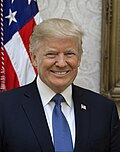| | |
|---|---|
| Abiy Ahmed | |
 "for his efforts to achieve peace and international cooperation, and in particular for his decisive initiative to resolve the border conflict with neighbouring Eritrea." | |
| Date |
|
| Location | Oslo, Norway |
| Presented by | Norwegian Nobel Committee |
| Reward | 9.0 million SEK (815 680 €) |
| First award | 1901 |
| Website | Official website |
The 2019 Nobel Peace Prize was awarded to the prime minister of Ethiopia Abiy Ahmed (born 1976) "for his efforts to achieve peace and international cooperation, and in particular for his decisive initiative to resolve the border conflict with neighbouring Eritrea." [1] The award was announced by the Norwegian Nobel Committee on 11 October 2019.
Contents
One year after Abiy received the prize, he presided over the outbreak of the Tigray War, which saw hundreds of thousands of casualties and led to the displacement of more than 800,000 persons. [2] In response to the outbreak of hostilities, the Norwegian Nobel Committee released a statement in January 2022 which called the humanitarian situation "extremely serious"; said the lack of delivery of humanitarian aid to Tigray was "unacceptable"; and observed that "As Prime Minister and a winner of the Nobel Peace Prize, Abiy Ahmed has a special responsibility to end the conflict and help to create peace." [3]
Since Abiy was awarded the prize, his leadership during Tigray War has been characterized by media organizations such as The Guardian, Der Spiegel, NPR, and CNN as genocidal. He has been frequently named as the least deserving winner of the Nobel Prize. [4] [5] [6] [7]














